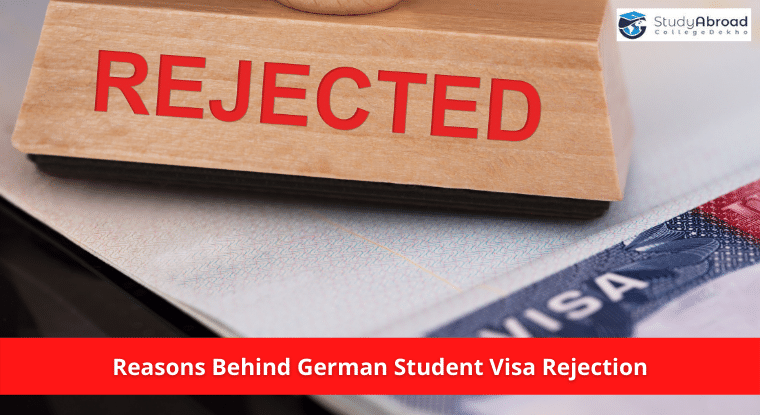A key element to receiving a valid German student visa is satisfying the financial requirements to study in Germany, which include acquiring the necessary funds. Therefore, when planning to study in Germany, one of the first things you should complete is acquiring the appropriate funds for the same. While you can complete the entire admission process at any given German university, it is always advisable to have the necessary funds at hand when applying for higher studies abroad.
In a bid to ensure that international student is capable of financially sustaining themself while completing their studies in the country, Germany has set up certain parameters and guidelines that all international students, specifically Non-EU/EEA students need to follow. These guidelines include the minimum amount that should be present in their blocked account each month, which can be changed subject to circumstances at the time.
In this article, we will highlight the financial requirements to study in Germany, including topics such as a Blocked Account, the documents that need to be submitted as well as any other important facets to studying in Germany this year.
What are the Financial Requirements to Study in Germany?
As an international student, many parameters need to be considered before you apply to the appropriate universities as well as the appropriate student visa. One of these parameters is the financial requirements to study in Germany.
Some of the financial requirements that students need to satisfy include presenting the appropriate proof of sufficient funds to, not only study in the country but also pay off daily, monthly and yearly expenses associated with living in the country.
To help students present valid proof of sufficient funds, the federal government of Germany has introduced several parameters that can help students present these requirements such as opening a blocked account.
But first, it is important to find out the costs of studying and living in Germany, which include finding out the exact costs of pursuing either a Bachelor's, Master or PhD degree from the country, as well as living expenses such as costs associated with food, transportation, utilities and amenities and leisure activities as well.
Another important aspect to consider when planning to study abroad is buying the appropriate Health Insurance for international students in Germany. The German student visa application requirements need applicants to present valid health insurance before they enter the country. When choosing a bank for your blocked account in Germany, international students will also be able to go through the insurance schemes offered by the banks.
The primary proof of financial funds to study in Germany is creating your own Blocked Account with a German bank. In this account, students will be asked to deposit around EUR 861 per month or EUR 10,332 per year, to present as proof of financial requirements.
Know What You Need to Study in Germany Here!
What is a German Blocked Account?
As the name suggests, a German blocked account is an account that remains blocked for the holder. However, a small detail attached to this is that a German blocked account remains blocked for the holder till the time they arrive in the country. A German blocked account has been designed to act as proof of sufficient financial funds for international students and job seekers planning to travel to the country.
As per current regulations for a German blocked account, international students must deposit a minimum of EUR 10,332 per year or EUR 861 per month. All interested students planning to complete their studies in Germany must present this amount, as decided based on the BAföG, a state funding in Germany for international students.
How to Open a German Blocked Account?
If you have decided to open a blocked account with a recognised banking institution in Germany, then you will need to follow the application process for blocked accounts, as specified individually by your choice of a bank in Germany. However, the general application process for a German blocked account is as follows:
-
Shortlist your preferred banking institution.
-
Visit the shortlisted bank’s official website and apply for a blocked account.
-
Most likely, you will be asked to download and fill out a pdf application form for the German blocked account offered by the bank.
-
Once applied, you will be asked to seek “proper legalisation at a German Embassy’. However, this will only be important if you choose a German or ‘Deutsche’ bank.
-
Deposit the minimum amount necessary into the blocked account.
-
Check and receive your confirmation for the German Blocked account.
Note: If you are facing trouble in choosing the right banking institution for your blocked account, it is advisable to experienced study abroad consultants or experts.
Documents Needed for a German Blocked Account
Those setting up a blocked account to study in Germany must submit a set of documents along with their application form. Listed below is the list of documents needed for a German blocked account.
-
The respective application form from the bank you have chosen for your blocked account.
-
A valid passport
-
A German university-issued admission letter confirming your enrolment.
-
A bank statement outlining your/your parent’s income.
-
An application fee for the German blocked account, as individually specified by the selected bank.
Note: Whichever bank you choose for your blocked account will define the application process and the documents you need to submit to open the respective blocked account.
Do I Need a Blocked Account to Study in Germany?
The first thing to understand is the need for setting up a blocked account to study in Germany. Most commonly, blocked accounts are used to act as proof of sufficient funds to apply for both, the German student visas and German universities as well.
While setting up a blocked account in Germany has been the most popular choice among prospective international students, there are alternatives to presenting valid proof of financial funds. Among these methods, students can choose to present a document stating the parent’s income and financial status, or a scholarship certificate from a recognised institution.
Additionally, international students can also present a Letter of Commitment, guaranteeing that a permanent resident of Germany, i.e. a relative or friend, will cover all the expenses that the international students may incur while studying in the country. Candidates can also submit a bank guarantee as proof of financial funds to study in Germany, instead of setting up a blocked account in Germany.
Listed below are some of the other ways to provide proof of sufficient funds to study in Germany:
-
Parental Income: As stated, prospective international students have the right to present their parent’s income as proof of sufficient funds. In this case, however, the German embassy may ask you to provide a bank statement of your parent’s income, at the least for the past three months, at the time of applying for the German student visa.
-
In addition to the bank statement, the German Embassy may also request your parent’s employment contract to ensure you have sufficient funds to complete your studies in the country.
-
-
Scholarships: Another option available to international students with respect to providing proof of financial funds, is providing proof of scholarship awarded to you. Here, if you have been awarded a scholarship by your home country that covers the required financial funds to complete your studies in the country will be considered proof of sufficient funds.
-
It should be noted that at the time of applying for the German student visa, you will be asked to present valid documentation that proves you have been awarded a scholarship that covers the entire cost of studying abroad.
-
-
Letter of Commitment: Instead of setting up a blocked account, you can also present a letter of commitment signed and authorised by a friend or family member who is a permanent resident of Germany. This letter should contain their commitment to fund your education in the country.
-
In case the German resident who has committed to cover your education costs is not your relative, the German Embassy may request a document outlining the terms and conditions for your agreement.
-
-
Bank Guarantee: As is common practice among international students, may apply for student loans to meet the minimum proof of financial funds. Germany also accepts these student loans as proof of financial funds. Here, the German embassy will require a bank guarantee wherein a bank will guarantee to pay all the financial obligations while you complete your studies in Germany.
Note: When applying for the appropriate German student visa, the relevant German embassy may ask you to present additional documents and financial proof to support your claims of having sufficient funds to study in Germany. However, this will be applicable only if you choose not to open up a blocked account in Germany.
How to Finance Your Studies in Germany?
Among the provisions offered by the German government for international students regarding their financial sustenance, taking up part-time jobs is one of the more popular options. However, before turning towards working while studying in Germany, students must first obtain the necessary financial funds to present as proof of their ability to sustain living in the country as well as undertake any emergency that may arise.
There are different ways that international students can choose to collect the appropriate funds to present as proof of financial funds to study in Germany. Some of the methods of acquiring funds include:
-
Personal Savings/Income: While it may seem an uncommon method of acquiring funds to study in Germany, students can use their savings and income to meet the minimum funds required to study in Germany. However, it is important to note that the university you may be applying to as well as for the German student visa, you may be required to present proof of source of such income as well.
-
Parent’s Income: One of the more common sources of presenting proof of financial funds for the course, you can use your parent’s income as proof of sufficient funds, provided they earn enough to support all the costs. You can also use the funds that your parents have saved up for your education, as this is commonly practised around the world.
-
Scholarships: A popular and sought-after method of financing higher studies in Germany, applying for the appropriate scholarships can vastly help cover your financial responsibilities. Institutions such as DAAD, Deutschlandstipendium, Erasmus+ and other privately funded scholarships are common scholarship opportunities used by international students wishing to study in Germany.
-
Student Loans: The more common method of financing your studies in Germany, and a key feature of the country specifically for international students, is that the international students can apply for student loan schemes. From government-funded to university-funded student loans, international students have access to various student loan schemes, usually with either low-interest rates or even zero interest.
-
Working in Germany: Among the popular ways to finance studying and living in Germany, opted by most international students in the country, is to work part-time jobs in Germany. These job roles can vary from on-campus to off-campus roles that can either be paid or unpaid.
In short, there is no lack of methods to finance your studies or cover your expenses in Germany. Even though Germany offers tuition-free studies in public universities with relatively inexpensive living costs, many students opt for different methods of financing their studies in the country.
Register and connect with study abroad experts who can help you apply to your dream course and university abroad.
Get Expert Guidance To Study in Germany Here!

























